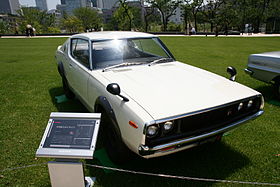Skyline GT-R
| Nissan Skyline GT-R | |
|---|---|
 |
|
| Overview | |
| Manufacturer | Nissan |
| Production |
|
| Assembly |
|
| Body and chassis | |
| Related | |
| Chronology | |
| Predecessor | Prince Skyline Sport |
| Successor | Nissan GT-R |
| First generation (KPGC10) | |
|---|---|
 |
|
| Overview | |
| Production | Feb 1969 – 1972 |
| Designer | Shinichiro Sakurai |
| Body and chassis | |
| Body style | |
| Layout | FR layout |
| Powertrain | |
| Engine | 2.0 L S20 I6 |
| Transmission | 5-speed manual |
| Dimensions | |
| Wheelbase | 2,570 mm (101.2 in) |
| Length | 4,400 mm (173.2 in) |
| Width | 1,665 mm (65.6 in) |
| Height | 1,370 mm (53.9 in) |
| Curb weight | 1,100 kg (2,425.1 lb) |
| Second generation (KPGC110) | |
|---|---|
 |
|
| Overview | |
| Production | January 1973 |
| Designer | Shinichiro Sakurai |
| Body and chassis | |
| Body style | 2-door coupe |
| Layout | FR layout |
| Powertrain | |
| Engine | 2.0 L S20 I6 |
| Transmission | 5-speed manual |
| Dimensions | |
| Wheelbase | 2,610 mm (102.8 in) |
| Length | 4,460 mm (175.6 in) |
| Width | 1,695 mm (66.7 in) |
| Height | 1,380 mm (54.3 in) |
| Curb weight | 1,145 kg (2,524.3 lb) |
| Third generation (R32) | |
|---|---|
 |
|
| Overview | |
| Production | August 1989 – November 1994 |
| Designer | Naganori Ito |
| Body and chassis | |
| Body style | 2-door coupe |
| Layout | Front engine, all-wheel drive |
| Powertrain | |
| Engine | 2.6 L RB26DETT twin-turbo I6 |
| Transmission | 5-speed manual |
| Dimensions | |
| Wheelbase | 2,615 mm (103.0 in) |
| Length | 4,545 mm (178.9 in) |
| Width | 1,755 mm (69.1 in) |
| Height | 1,341 mm (52.8 in) |
| Curb weight | 1,430 kg (3,152.6 lb) |
| Fourth generation (R33) | |
|---|---|
 |
|
| Overview | |
| Production | January 1995 – November 1998 |
| Designer | Kozo Watanabe |
| Body and chassis | |
| Body style | |
| Layout | Front engine, all-wheel drive |
| Powertrain | |
| Engine | |
| Transmission | 5-speed manual |
| Dimensions | |
| Wheelbase | 2,720 mm (107.1 in) |
| Length | 4,675 mm (184.1 in) |
| Width | 1,780 mm (70.1 in) |
| Height | 1,360 mm (53.5 in) |
| Curb weight | 1,530 kg (3,373.1 lb) |
| Fifth generation (R34) | |
|---|---|
 |
|
| Overview | |
| Production | January 1999 – August 2002 |
| Designer | Kozo Watanabe |
| Body and chassis | |
| Body style | 2-door coupe |
| Layout | Front engine, all-wheel drive |
| Powertrain | |
| Engine | 2.6 L RB26DETT twin-turbo I6 |
| Transmission | 6-speed manual |
| Dimensions | |
| Wheelbase | 2,665 mm (104.9 in) |
| Length | 4,600 mm (181.1 in) |
| Width | 1,785 mm (70.3 in) |
| Height | 1,360 mm (53.5 in) |
| Curb weight | 1,536 kg (3,386.3 lb) |
The Nissan Skyline GT-R is a Japanese sports car based on the Nissan Skyline range.
The first cars named "Skyline GT-R" were produced between 1969 and 1972 under the model code KPGC10, and enjoyed legendary success in local Japanese touring car racing. This model was followed by a brief production run of second-generation cars, under model code KPGC110, in 1973. After a 16-year hiatus, the GT-R name was revived in 1989 as the BNRR32 ("R32") Skyline GT-R. This model GT-R proceeded to win the Japanese JTCC Group A series championship four years in a row. The R32 GT-R also had success in the Australian Touring Car Championship helping the R31 Skyline GTS-R to victory in 1990 and winning alone in 1991 and 1992, until a regulation change excluded the GT-R in 1993.
The formidable technology and performance of the R32 GT-R prompted the Australian motoring publication Wheels to nickname the GT-R "Godzilla" in its July 1989 edition.
The Skyline GT-R became the flagship of Nissan performance, showcasing many advanced technologies including the ATTESA E-TS AWD system and the Super-HICAS four-wheel steering. Today, the car is popular for import drag racing, circuit track, time attack and events hosted by tuning magazines. Production of the Skyline GT-R ended in August 2002. The car was replaced by the Nissan GT-R, an all-new vehicle no longer based on the Skyline.
The Skyline GT-R was never manufactured outside Japan, and the sole export markets were Hong Kong, Australia and New Zealand, in 1991, and the UK (in 1997, thanks to the Single Vehicle Approval scheme) as used Japanese imports. Despite this, the car has become an iconic sports car, including in countries from the Western World (mainly the United Kingdom, Australia, New Zealand, South Africa, Ireland, Canada, and the United States). It has become notable through pop culture such as The Fast and the Furious series, Initial D, Shakotan Boogie, Wangan Midnight, Need For Speed series, Driving Emotion Type-S, and Gran Turismo series.
...
Wikipedia
